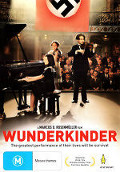
Directed by
Marcus H. Rosenmüller
96 minutes
Rated M
Reviewed by
Bernard Hemingway

Wunderkinder
Synopsis: An account of the friendship between two Jewish children, Larissa and Abrascha, both musical prodigies, and a non-Jewish German girl, Hanna, in central Ukraine during WWII, set against the background of the German invasion of Russia, as recalled by the latter, now in her 70sThe Holocaust film is a well-stocked filmic category with tropes as well-established as those of the Western and the gangster movie. Wunderkinder is no exception to the type but it presents its moving story in a measured way only stumbling towards its latter stages into overly melodramatic territory.
The strength of the film is in its relatively novel context of German-Russian relations and the way that it interweaves the broad historical background with the relationship between the children who occupy its foreground. Initially the Russians are willing hosts to the Germans under the umbrella of the Stalin-Hitler peace pact. But once Hitler decides to invade Russia this changes dramatically with initially the Germans terrorising the Russians and then, once the Wehrmacht invasion starts to crumble, the Russians retaliating. Cutting across this fluctuating situation is the issue of Larissa and Abrascha’s Jewishness, something which not just the Nazis but the Communists also regard as a taint.
This four-cornered set-up enables director/co-writer Marcus Rosenmüller to avoid a tired good-guy/bad guy opposition and thus whilst we see the Nazis stigmatized for their familiar crimes we also see Jews helping Germans, Germans who are not stereotypical anti-Semites and Communists behaving with arrogance and prejudice.
The sorry world of adults is contrasted with the relationship between the children who have no awareness of their political, ethnic and religious differences but simply unite in friendship and their affinity for music. Although the film adopts a restrained approach, intentionally avoiding scenes that would be too much for younger audiences, Konstantin Wecker is truly chilling as SS Colonel Schartow, a man who embodies the clinical ruthlessness and disguised sadism of the Nazi philosophy. The film only stumbles in a scene involving the children’s music teacher (Gudrun Landgrebe) and a couple of Wehrmacht soldiers. It is too glibly handled and detracts from the credible approach that largely distinguishes the film otherwise.
Whilst almost needless to say there is a very clear agenda to the film this is not a bad thing. An end title dedicates it to the 1.5 million Jewish children who died in the Holocaust, and as a tribute to their unintended heroism and a condemnation of the cruel folly of man, Wunderkinder expresses a sentiment with which few would quibble. Although its story is fictional, the tragedy which it represents feels palpably real.
FYI: Elin Kolev who plays Abrascha, performed all his own pieces.

Want more about this film?


Want something different?




